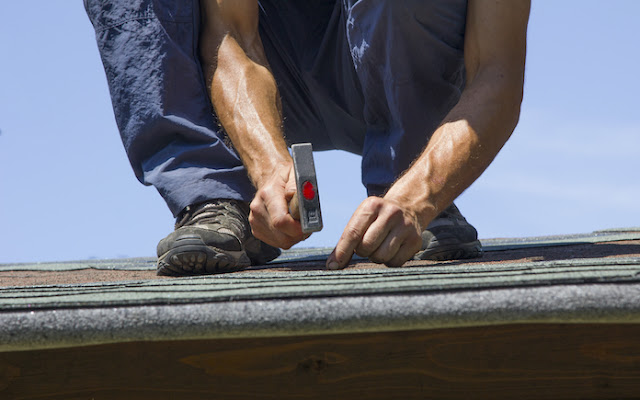As a rule, you absolutely cannot hire them without the following qualities:
1. Insurance
If the contractor causes damage to your house, liability insurance will cover the costs. Having workers' compensation insurance protects you against lawsuits filed by injured employees.
A roofing insurance policy has several types of small business insurance to cover a wide array of problems.
These issues include workplace injuries, damage to your business property and lawsuits from clients who claim your work is poor or incomplete (even if the claim is without merit).
>> Related Post: The Cost-Effectiveness of a Customised CRM System.
A good place to start is with a business owners policy (BOP). A BOP bundles three important coverage types, and it’s usually cheaper than buying each coverage type separately.
Here’s what is included in a BOP:
Business liability insurance
This covers property damage and bodily injuries caused to others (not including your workers). For example, if a customer trips over your work equipment and gets hurt, your general liability insurance would pay for medical expenses, court judgments, settlements and legal defense costs.
Commercial property insurance
This covers the physical location of your business and equipment if they’re damaged due to a covered problem like a fire.
Both leased and owned equipment is covered by commercial property insurance, including tools, inventory, business records, valuable papers, computers and office furniture.
Business interruption insurance
If you have to temporarily shut down work because of a problem covered by your policy, such as a fire or theft, business interruption insurance replaces lost income.
>> Related Post: Most common questions about roofing services.
This also handles lost income due to damaged merchandise and the cost of moving your business to a new location on a temporary basis.
2. Bonded
A roofer who has bonded guarantees that you will be financially paid if he or she fails to complete the work or performs a lousy job.
When selecting a professional roofer, you always want to see that the roofing contractor is bonded for your protection.
A bond, also known as a surety bond, is a legal contract that protects one party against monetary loss if the second party fails to perform the agreed task.
That means that as the owner of a property, you are protected should your roofing professional fail to fulfill the terms of the contract you agreed upon.
In order to be bonded, a roofing professional must provide a great deal of information to the bonding company.
For example, the roofer must submit a business plan, a description of the proposed work or work in progress, multiple financial statements, proof of availability of credit with an accredited bank, the project is well funded, and that the company has a solid reputation and doesn’t abuse subcontractors.
For a new company with no track record, a bond is often difficult to obtain, and if they do, they often have limited bonding capacity.
>> Related Post: Simple CRM for Managing Complex Tasks.
Construction bonds do have some drawbacks. The bonding premium is usually 1-2 percent of the project price — a cost that is passed on to the owner in the form of a higher bid. However, the peace of mind and protection for the owner is often well worth the price.
Bonding is much more common in commercial and industrial roofing projects because of the high dollar value of the materials and the cost of labor associated with the job.
Different types of bonds are used throughout the process — bid, performance and payment bonds — and each has a different purpose.
3. Licensed
A license proves that you are authorized to do business in your jurisdiction. A homeowner's insurance policy may not cover work performed by an unauthorized firm because it did not get the proper permissions.
One of the most important–and most obvious–reasons to get a roofing license is for legality. Fines and jail time could become a reality if you don’t comply with state requirements, damaging your roofing company’s reputation.
Homeowners may ask you if you have a license. Because getting a roofing license requires experience, having a license gives the homeowner the assurance that you have the training and expertise needed to do their project well.
Getting a roofing license often means you need to have liability insurance. Not only does this protect you, but your customers will also appreciate knowing that any damage to the job will be covered by you.
>> Related Post: Improvements in Management Skills That Can Be Achieved With the Right Contractor CRM.
A roofing license will give both you and the homeowner peace of mind. You will be working legally and within government requirements. Your customers will trust you and be more likely to hire you with the assurance that you know your industry.
4. Local
It's local, so if anything goes wrong with your roof next month or next year, you can count on a local roofer to come to fix it.
Tip: Be wary of any roofer who is hesitant to provide you with copies of his license and insurance. You don't want to end up like the customer whose roofer collected a 50% deposit and then vanished to another state with nothing but an hour-old business card.
Conclusion
Swadley Roof Systems offers the best roofing services in the Houston, Austin, San Antonio and Dallas area.
- Tel: 832-559-8463
- Email: info@swadleyroofsystems.com
- Location: 17413 FM 2920 Suite O Tomball, TX 77377
- Facebook: Fanpage Swadley Roof Systems
- Website: https://www.swadleyroofsystems.com/







0 Comments
Đăng nhận xét